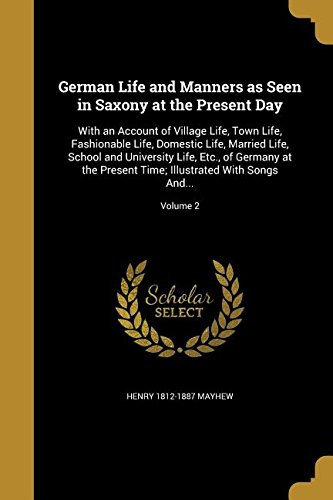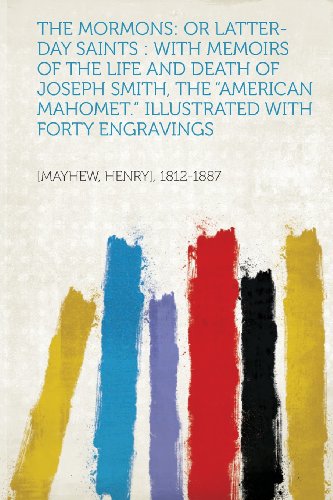Background
Henry Mayhew was born on November 25, 1812, in London, England, one of seventeen children of Joshua Mayhew.



( This work has been selected by scholars as being cultur...)
This work has been selected by scholars as being culturally important, and is part of the knowledge base of civilization as we know it. This work was reproduced from the original artifact, and remains as true to the original work as possible. Therefore, you will see the original copyright references, library stamps (as most of these works have been housed in our most important libraries around the world), and other notations in the work. This work is in the public domain in the United States of America, and possibly other nations. Within the United States, you may freely copy and distribute this work, as no entity (individual or corporate) has a copyright on the body of the work. As a reproduction of a historical artifact, this work may contain missing or blurred pages, poor pictures, errant marks, etc. Scholars believe, and we concur, that this work is important enough to be preserved, reproduced, and made generally available to the public. We appreciate your support of the preservation process, and thank you for being an important part of keeping this knowledge alive and relevant.
http://www.amazon.com/gp/product/1362573078/?tag=2022091-20

(Unlike some other reproductions of classic texts (1) We h...)
Unlike some other reproductions of classic texts (1) We have not used OCR(Optical Character Recognition), as this leads to bad quality books with introduced typos. (2) In books where there are images such as portraits, maps, sketches etc We have endeavoured to keep the quality of these images, so they represent accurately the original artefact. Although occasionally there may be certain imperfections with these old texts, we feel they deserve to be made available for future generations to enjoy.
http://www.amazon.com/gp/product/1313823562/?tag=2022091-20
journalist playwright researcher
Henry Mayhew was born on November 25, 1812, in London, England, one of seventeen children of Joshua Mayhew.
Mayhew was educated at Westminster School before running away from his studies to sea.
He ran away to sea at age 12 and made a voyage to India. Upon his return he studied law with his father but soon turned to journalism. He helped to found the periodicals Figaro in London (1831) and The Thief (1832) before organizing the highly successful Punch, of which he was coeditor (with Mark Lemon) for two years. He also wrote plays, farces, fairy tales, and novels, some in collaboration with his brother.
Mayhew had a genius for lively and sensitive reportage of people, including social outcasts and nomads, and of contrasting ways of life; and he was able to combine his observation with penetrating economic and social analysis, some of it with a Marxist flavour. London Labour and the London Poor was based on letters he wrote to the London Morning Chronicle in 1849–1850, at the end of a stormy decade in British social history. Responding to the newspaper’s desire for "trustworthy information" on the great social problems of the day, Mayhew prepared three volumes that were published in 1851; the fourth volume, The Criminal Prisons of London, was written in collaboration with John Binny and did not appear until 1862. A revised complete edition was published in 1864.
Short of money in his later years, Henry Mayhew produced much hackwork and died on July 25, 1887, in obscurity.
(Unlike some other reproductions of classic texts (1) We h...)
( This work has been selected by scholars as being cultur...)
Quotations:
"The deductive method is the mode of using knowledge, and the inductive method the mode of acquiring it. "
"It is easy enough to be moral after a good dinner beside a snug coal fire, and with our hearts well warmed with fine old port. "
"Facts, according to my ideas, are merely the elements of truths, and not the truths themselves; of all matters there are none so utterly useless by themselves as your mere matters of fact. "
